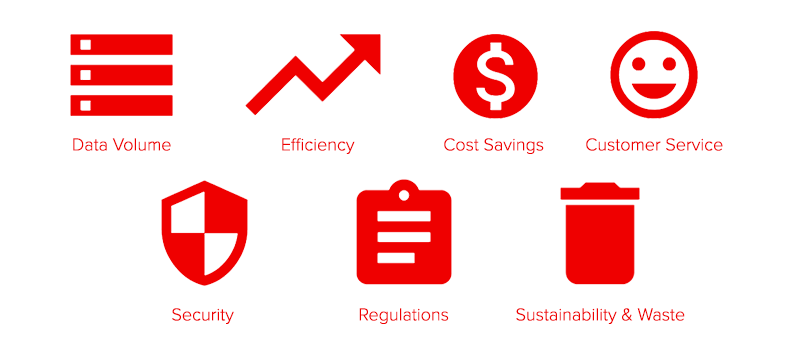Stay up to date with our latest news and insights
Supporting description on the types of content that feature in the blog.
01 February 2018

Technology continues to get smarter, and the same thing is happening with paper to digital. But why should your business invest more time in transforming paper processes to digital alternatives?
Digital transformation shouldn’t create more work for you. It aims to reduce manual labour, along with cost, while increasing security and creating less waste.

Businesses that create a lot of data need to ensure that it can be easily accessed rather than simply filed away or discarded entirely.
Digitisation allows for all documents and data to be retained in the cloud where it can be easily accessed.
Digital processes are much faster and can be more easily amended than paper processes.
That means when errors occur, they can be rectified very quickly, saving time and your company’s reputation.
Printing isn’t cheap, particularly if the processes surrounding it aren’t optimised.
Digital transformation enables you to remove expensive print processes and reduce the costs associated with them.
The faster and smarter you work, the better service your customers will experience.
What’s more, if you can lower your back-end infrastructure and printing costs, you’ll be able to free up funds that can be invested into front of house operations such as customer service and marketing.
Paper has always been insecure; a sheet containing confidential information can go anywhere at any time and with anyone.
Once the GDPR rules come into effect this May, hefty fines will be levied against insecure data storage. This makes transferring confidential information from paper to digital all the more important.
Complying with privacy legislation isn’t easy, unless you know exactly where and how your records are stored.
You also need to know who accessed them (and when), and what they’ve done with the data. Digital processes enable audit trails to be completed that reveal this vital breadcrumb trail.
Using paper as a business inevitably creates a large carbon footprint.
With around 50% of printed pages getting thrown away, businesses continue to consume more energy than they need to. By going digital, your organisation will cut waste and, consequently, become a whole lot greener.
Transforming from paper to digital isn’t an overnight process, but the sooner you start and the more comprehensive your plans to do so, the more efficient, green and productive your business will become.
Supporting description on the types of content that feature in the blog.

20-09-2024
Digital document management tools offer a range of compelling benefits for businesses, including a PDF editor, a file converter and a form generator. You can also integrate with digital signatures qui...

20-09-2024
When choosing a SaaS software to deal with your company’s PDF documents and enable forms to be digitally sent and signed, you’ll want a product that’s user-friendly and easy to use. With Tungsten’s Po...

11-07-2024
Belkin is a global technology company that provides high-quality electronics products, from wireless chargers to power banks. Their people-centric approach and best-in-class functionality have positio...